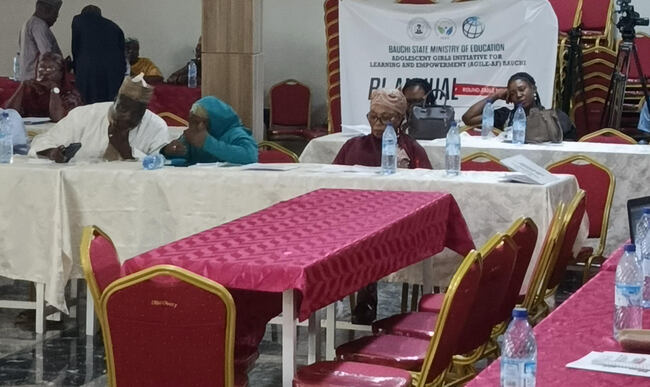Bauchi State Commissioner of Education Dr. Jamila Muhammad Dahiru has said that adolescent girls in the state are facing challenges that are excluding them from having unhindered access to education.
She stressed that some of the identified challenges, as well as those that are salient, are preventing those that have started schooling from completing secondary education.
The Commissioner made the assertion on Saturday during a Bi-Annual Media Roundtable Meeting on the implementation of the World Bank-Assisted Project tagged Adolescent Girls Initiative for Learning and Empowerment (AGILE) in Bauchi State.
Represented by the Permanent Secretary in the Ministry, Ali Babayo, the Commissioner said that the roundtable media engagement was another effort by the Bauchi State Government in carrying the media along, as key partners, in changing the indices of adolescent education in the State.
Jamila Dahiru said that the state government is doing all it takes to change the face of education for the better, emphasising that the state keying into the AGILE Project is a pointer to that resolve.
Giving an overview of the AGILE Intervention, the State Coordinator of the Project, Ali Sule Gar, said that the project objective is to improve secondary education opportunities among girls in Bauchi State.
He disclosed that the AGILE Project intends to use a comprehensive approach to address critical constraints that adolescent girls face, which limit their ability to complete secondary school.
Ali Sule Gar also said that the project will seek to achieve the objectives through the use of school, family, and community structures to empower adolescent girls.
The coordinator further said that the strategy approach of the AGILE Project will consist of interventions aimed at keeping girls in school and also provide opportunities for them to acquire critical skills, which will in turn empower them to enrol, stay, complete, and possibly transit to the tertiary level of education.
In her remarks, the communication officer of the project, Halima Ibrahim Dimis, assured that all inputs collated from the breakout session and other contributions made will be carefully filtered to see those that align with the project’s objectives and incorporate them in the implementation strategy.
While interacting with the participants, who all described the roundtable meeting as innovative and engaging, Halima Ibrahim Dimis expressed her profound gratitude to the participants for the enthusiasm demonstrated during the meeting, describing the gesture as heartwarming and encouraging.
She then said that the State Project Implementation Unit of the AGILE Project will not take that demonstration of commitment for granted but will use it as a means of fostering impactful relationships for the success of the project.
During the course of interaction, the participants, who are managers of both federal, state, and private media organisations in the state, as well as other practicing journalists cut across radio, television, print, online, and new media.
The media executives and practicing journalists identified poverty as one of the leading causes of poor secondary school enrolment of adolescent girls in the state, just as they also unanimously agreed that the decay in school infrastructure has contributed to making the enrolment drive of adolescent girls into schools unattractive.
At a breakout session during the meeting, other underlying challenges militating the enrolment of adolescent girls into school, identified by the media practitioners that came to the fore include inadequate WASH facilities in schools, an insecure school environment, early marriage, and weak community engagement.
The participants then urged the State AGILE Project Implementation Unit to leverage the media, using their various channels, for continuous awareness creation and advocacy through reportages to address some of the challenges identified as proffered solutions.
The issue of safe space in the schools was also stressed considering the fact that every girl child requires a safe space in order to feel free to learn, particularly in terms of toilets and during her menstrual process.
They agreed that with such a safe space adequately provided, the adolescent girls will not only start school but be comfortable staying around and completing it.
The AGILE Project Coordinating Office promised to make the media roundtable engagement a constant thing in order to achieve the set objectives of the project in the state.
ALSO READ THESE TOP STORIES FROM NIGERIAN TRIBUNE
